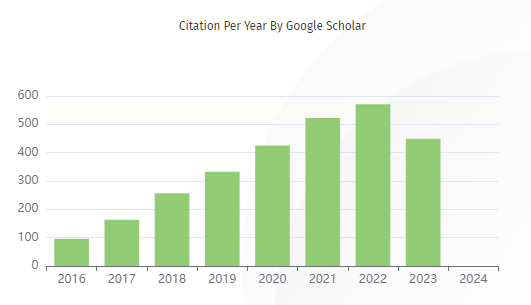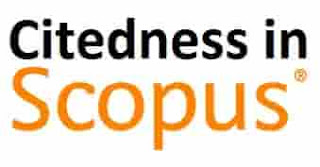Model Penerimaan Petani terhadap Teknologi Sistem Pertanian Organik di Kabupaten Tasikmalaya
DOI:
https://doi.org/10.12695/jmt.2017.16.1.6Keywords:
Acceptance of Technology, Theory of Planned Behavior, Theory of Acceptance Model, Organic FarmingAbstract
Abstract. The survey result of Indonesian Organic Alliance (AOI) shows that there were 40% increasing of organic food consumer during 2012 to 2013. This condition indicates that the availability of organic product should be increased. The purpose of this research is to develop a model which describes the factors that affect the farmers’ intention on implementing organic farming technology, especially in Tasikmalaya, Indonesia, and to identify the influence of perceived usefulness toward the attitude in implementing organic farming technology. The factors influencing farmers’ intention are identified through understanding about the influence of attitude, subjective norm, and behavioral control. Research model testing was conducted using the approach of Partial Least Square (PLS) with sample data obtained through interviews with 81 organic farmers in Tasikmalaya, West Java. The result of this research shows that perceived usefulness construct is significantly influence farmer’s attitude towards organic farming. Moreover, attitude, subjective norm, and behavioral control are also significantly influenced towards farmer’s intention to organic farming.
Keywords: Acceptance of Technology, Theory of Planned Behavior, Theory of Acceptance Model, Organic Farming, Farmer’s Intention
Â
Abstrak. Hasil survei Aliansi Organis Indonesia (AOI) menunjukkan bahwa terjadi peningkatan konsumen pangan organic sebesar 40% pada periode 2012 hingga 2013. Kondisi tersebut mengindikasikan bahwa produksi hasil pertanian organik perlu ditingkatkan. Penelitian ini bertujuan untuk memodelkan faktor-faktor yang memengaruhi niat petani terhadap implementasi teknologi pertanian organik khususnya di Kabupaten Tasikmalaya, Indonesia, dan mengidentifikasi pengaruh keuntungan yang dirasakan terhadap sikap dalam mengimplementasikan teknologi pertanian organik. Faktor-faktor yang berpengaruh terhadap niat petani diidentifikasi melalui pemahaman mengenai pengaruh sikap, norma subjektif, dan kontrol perilaku. Pengujian model penelitian dilakukan menggunakan pendekatan Partial Least Square (PLS) dengan data sampel diperoleh dengan melakukan wawancara terhadap 81 petani organik di Kabupaten Tasikmalaya. Hasil dari pengujian model menunjukkan bahwa konstruk keuntungan secara signifikan memengaruhi sikap. Selain itu, konstruk sikap, norma subjektif, dan kontrol perilaku secara signifikan memengaruhi niat petani dalam penerimaan teknologi pertanian organik.
Kata kunci: Penerimaan Teknologi, Theory of Planned Behavior, Theory of Acceptance Model, Pertanian Organik, Niat Petani
Â
Downloads
References
Ariesusanty, L., Nuryati, S., & Wangsa, R. (2014). Statistik Pertanian Organik Indonesia 2013. Bogor: Aliansi Organis Indonesia.
Borges, J. A. R., Lansink, A. G. O., Ribeiro, C. M., & Lutke, V. (2014). Understanding farmers’ intention to adopt improved natural grassland using the theory of planned behavior. Livestock Science, 169, 163-174.
Chinnici, G., D'Amico, M., & Pecorino, B. (2002). A multivariate statistical analysis on the consumers of organic products. British Food Journal, 104(3/4/5), 187-199.
David, W., & Ardiansyah. (2016). Organic agriculture in Indonesia: challenges and opportunities. Organic Agriculture, 1-10.
Davis, F. D. (1989). Perceived Usefulness, Perceived Ease of Use, and User Acceptance of Information Technology, Mangement Science, 13,3, 319-340.
Davis, L. E., Ajzen, I., Sauders, J., & Williams, T. (2002). The Decision of African American Students to Complete High School : An Application of The Theory of Planned Behavior, Journal of Educational Psychology, 94, 810 -819.
Fairweather, J.R., & Campbell, H. (1996). The Decision Making of Organic and Conventional Agricultural Procedures, Agribusiness and Economics Research Report, 230.
Fishbein, M., & Ajzen, I. (1975). Belief, Attitude, Intention, and Behavior: An Introduction to Theory and Research, Canterbury: Addison-Wesley Publishing Company.
Hansson, H., Ferguson, R., Olofsson, C., & Rantamäki-Lahtinen, L. (2013). Farmers' motives for diversifying their farm business–The influence of family. Journal of Rural Studies, 32, 240-250.
IFOAM. (2015). Into the Future: Consolidated Annual Report of IFOAM - Organics International. Bonn: IFOAM - Organics International Head Office.
Kock, N. (2014). Advanced mediating effects tests, multi-group analyses, and measurement model assessments in PLS-based SEM. International Journal of e-Collaboration, 10(1), 1-13.
Läpple, D., & Kelley, H. (2013). Understanding the uptake of organic farming: Accounting for heterogeneities among Irish farmers. Ecological Economics, 88, 11-19.
Mayrowari, H. (2012). Pengembangan pertanian organik di Indonesia. Jurnal Forum Penelitian Agro Ekonomi, 30(2), 91-108.
Morgan, K., & Murdoch, J. (2000). Organic vs. conventional agriculture: knowledge, power and innovation in the food chain. Geoforum, 31(2), 159-173.
Naik, M. H., Srivastava, S. R., Godara, A. K., & Yadav, V. P. S. (2009). Knowledge level about organic farming in Haryana. Indian Research Journal of Extension Education, 9(1), 50-53.
Padel, S. (2001). Conversion to Organic Farming : A Typical Example of The Diffusion of an Innovation ?, Sociologia Ruralis, 41, 1.
Poppenborg, P., & Koellner, T. (2013). Do Attitude Toward Ecosystem Service Determine Agricultural Land Use Practices? An Analysis of Farmers Decision Making in A South Korean Watershed, Journal of Land Use Policy, 31, 422-429.
Voss, J., Spiller, A., & Enneking, U. (2009). The Acceptance of Genetically Modified Seeds in German Agriculture. Agriculture 58(3), 155-167.
Yazdanpanah, M., Hayati, D., Hochrainer-Stigler, S., & Zamani, G. H. (2014). Understanding farmers' intention and behavior regarding water conservation in the Middle-East and North Africa: A case study in Iran. Journal of environmental management, 135, 63-72.
Zhang, J., Zhang, X., Mu, W., Zhang, J., & Fu, Z. (2008). Farmers’ Information Usage Intention in China Based on The Technology Acceptance Model. International Conference on Computer and Computing Technologies in Agriculture, 1845-1853.
Downloads
Submitted
Accepted
Published
How to Cite
Issue
Section
License

This work is licensed under a Creative Commons Attribution-NonCommercial-ShareAlike 4.0 International License. Copyright @2023. This is an open-access article distributed under the terms of the Creative Commons Attribution-NonCommercial-ShareAlike 4.0 International License (http://creativecommons.org/licenses/by-nc-sa/4.0/) which permits unrestricted non-commercial used, distribution and reproduction in any medium.

















